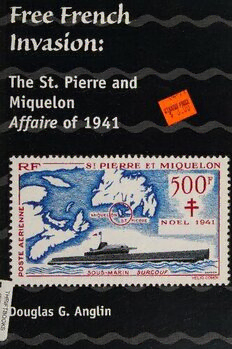
Free French Invasion: The St. Pierre and Miquelon Affaire of 1941 PDF
252 Pages·1999·13.877 MB·English
Most books are stored in the elastic cloud where traffic is expensive. For this reason, we have a limit on daily download.
Preview Free French Invasion: The St. Pierre and Miquelon Affaire of 1941
Description:
On Christmas Day, 1941, two tiny French islands off the southern coast of Newfoundland were suddenly catapulted from obscurity into world prominence when the North American press, led by the New York Times, reported in front-page banner headlines that the "Free French Seize St. Pierre and Miquelon." The international repercussions of the dramatic invasion were so great that the leading Allied statesmen found themselves diverted from the pressing problems of world strategy in the hectic aftermath of Pearl Harbor to settle the fate of the tiny island outpost. The night of December 23, 1941 found the Free French squadron of three corvettes The Mimosa, Alysse, the Aconit and the giant submarine Surcouf laying off the south coast of Newfoundland. The flotilla had left Halifax a few days before under the pretext of a training exercise. The commander was Vice Admiral Emile Henri Muselier. On the dawn of the day before Christmas the Free French war ships crept into the sheltered harbor of St. Pierre. In one of the most unlikely invasion. liberation and escapade of World War II, the warships pulled up to the snow-covered government unopposed. A company of uniformed sailors and marines armed with submachine guns were landed. They were equipped with tin helmets, rations, flasks of vin ordinaire and even gas masks. The apprehensive troops were ready for any eventuality. The eleven French gendarmes ashore gave up their weapons and joined the newcomers in occupying strategic points in the town of St. Pierre. The police barracks, the custom house, the radio station and the Western Union cable-telegraph office were occupied without a shot being fired. Within half an hour the invasion was over. Pro-Vichy Governor Baron Gilbert de Bournat was lead away to a cabin-prison on the Aconit. To shouts from the crowd of "Vive de Gaulle" he replied defiantly "Vive Ptain". Vichy agent Henri Moraz and the pro-Vichy radio station manager, de Lort, were placed under house arrest. Aboard the invasion fleet was Free French hanger-on Marcel Benda, a journalist for the Montreal Le Jour. Benda was charged with getting favorable press and publicity for the Gaullist cause. He had clandestinely enlisted New York Times reporter Ira Wolfert to accompany the invasion fleet. By five minutes past midnight on December 25 the story of the invasion was telegraphed to Canadian and American newspapers. The invasion had been carried out flawlessly. It met the tacit approval of the Ottawa and London governments, who had earlier recognized the legitimacy of de Gaulle's Free French. However, it met immediate disapproval from the U.S. State Department. On Christmas Day, Cordell Hull, U.S. secretary of state, had the State Department issue a statement sneering at the "so-called Free French navy" and demanding restoration of St. Pierre and Miquelon to Vichy. By appeasing the Vichy government and refusing recognition to the Free French, Hull hoped to keep the French Fleet and it's African bases out of German hands. According to a Time Magazine editorial "To put it bluntly, [Hull] ... didn't think two rocks are worth the French Fleet". Admiral Muselier, bristling at the anti-democratic United States stance, issued orders that no warships or aircraft would be allowed near the islands. He threatened to blackout all lighthouses, organized a St. Pierre home guard. Douglas Anglin has written the first comprehensive study of St. Pierre and Miquelon affaire. He not only traces the wartime history of the islands first under Vichy and then Free French rule, but also treats the episode as a case study of international relations within the North Atlantic quadrangle. This is the larger significance of the incident for the course of the war as well as for the present. Many of the fundamental factors involved, and one of the principle personalities - Charles de Gaulle effect present day international politics. Much of the strange story which Dr. Anglin has pieced together is recounted here for the first time. It should appeal to all who are interested in the lighter side of the political and military conduct of the war, the role of personalities in history, the relations of Free France and Vichy, the evolution of the Atlantic community and the story behind the 'France Libre FNFL' overprinted stamps of 1941-1942.
See more
The list of books you might like
Most books are stored in the elastic cloud where traffic is expensive. For this reason, we have a limit on daily download.
